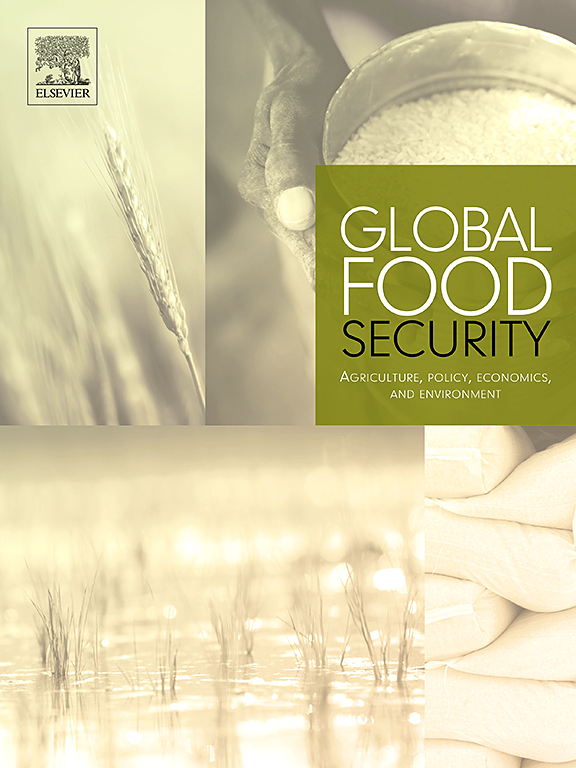The agrifood-system wage gap and structural transformation: cross-country evidence
IF 9.6
1区 经济学
Q1 FOOD SCIENCE & TECHNOLOGY
Global Food Security-Agriculture Policy Economics and Environment
Pub Date : 2025-07-01
DOI:10.1016/j.gfs.2025.100851
引用次数: 0
Abstract
Evidence from high income countries shows that the gender pay gap in wage employment has decreased over time, though it has not closed. However, little evidence exists on how the gender wage gap varies as countries undergo processes of structural transformation that lead to rising wages and a shift in employment from primary agricultural production. Disaggregating agricultural, agrifood-system and non-agrifood-system wage employment, this study provides empirical estimates of the gender pay gap across countries at different stages of structural transformation. Based on a multi-country dataset and using the Kitagawa-Oaxaca-Blinder decomposition approach, the study sheds light on the different factors driving the pay gap along the structural transformation process. Our analysis shows significant gender gaps in both agrifood systems and non-agrifood systems that do not always decrease with structural transformation. Both differences in female and male employee's observed characteristics and differences in returns continue to contribute to gender gaps, suggesting the need for gender-responsive policies to address the underlying factors that drive these gaps.
农业食品系统的工资差距和结构转型:跨国证据
来自高收入国家的证据表明,工资就业中的性别工资差距随着时间的推移而缩小,尽管尚未完全消除。然而,很少有证据表明,随着各国经历导致工资上涨和就业从初级农业生产转移的结构转型进程,性别工资差距如何变化。本研究对农业、农业食品系统和非农业食品系统的工资就业进行了分类,对处于不同结构转型阶段的国家的性别工资差距进行了实证估计。该研究基于多个国家的数据集,并使用Kitagawa-Oaxaca-Blinder分解方法,揭示了在结构转型过程中导致薪酬差距的不同因素。我们的分析表明,在农业食品系统和非农业食品系统中存在显著的性别差距,这种差距并不总是随着结构转型而减少。男女雇员所观察到的特点差异和回报差异继续造成性别差距,这表明需要制定促进性别平等的政策,以解决造成这些差距的根本因素。
本文章由计算机程序翻译,如有差异,请以英文原文为准。
求助全文
约1分钟内获得全文
求助全文
来源期刊

Global Food Security-Agriculture Policy Economics and Environment
FOOD SCIENCE & TECHNOLOGY-
CiteScore
20.90
自引率
3.40%
发文量
69
期刊介绍:
Global Food Security plays a vital role in addressing food security challenges from local to global levels. To secure food systems, it emphasizes multifaceted actions considering technological, biophysical, institutional, economic, social, and political factors. The goal is to foster food systems that meet nutritional needs, preserve the environment, support livelihoods, tackle climate change, and diminish inequalities. This journal serves as a platform for researchers, policymakers, and practitioners to access and engage with recent, diverse research and perspectives on achieving sustainable food security globally. It aspires to be an internationally recognized resource presenting cutting-edge insights in an accessible manner to a broad audience.
 求助内容:
求助内容: 应助结果提醒方式:
应助结果提醒方式:


